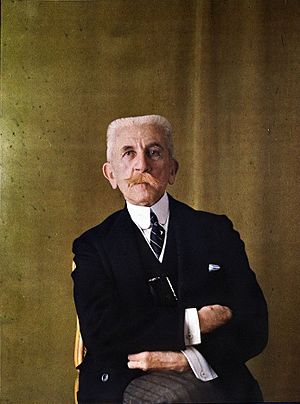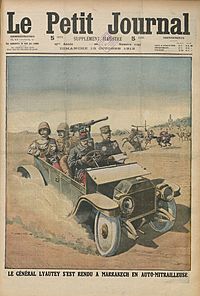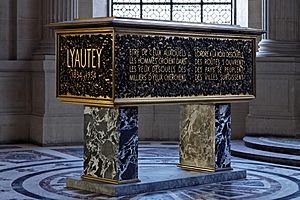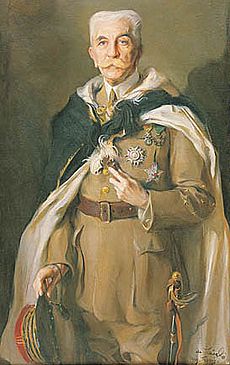Hubert Lyautey facts for kids
Quick facts for kids
Marshal
Hubert Lyautey
|
|
|---|---|

Marshal Lyautey, May 1927
|
|
| 114th Minister of War | |
| In office 12 December 1916 – 15 March 1917 |
|
| President | Raymond Poincaré |
| Prime Minister | Aristide Briand |
| Preceded by | Pierre Roques |
| Succeeded by | Paul Painlevé |
| 1st Resident-General of France in Morocco | |
| In office 4 August 1907 – 25 August 1925 |
|
| Preceded by | Office established |
| Succeeded by | Théodore Steeg |
| Seat 14 of the Académie française | |
| In office 31 October 1912 – 27 July 1934 |
|
| Preceded by | Henry Houssaye |
| Succeeded by | Louis Franchet d'Espèrey |
| Personal details | |
| Born | 17 November 1854 Nancy, French Empire |
| Died | 27 July 1934 (aged 79) Thorey, French Republic |
| Resting place | Les Invalides |
| Nationality | French |
| Spouse | Inès de Bourgoing |
| Parents |
|
| Alma mater | École Spéciale Militaire |
| Signature |  |
| Military service | |
| Allegiance | |
| Branch/service | French Army |
| Years of service | 1873 – 1925 |
| Rank | Marshal |
Louis Hubert Gonzalve Lyautey (17 November 1854 – 27 July 1934) was a famous French general and leader. He worked in many different countries that were French colonies. After serving in places like Indochina and Madagascar, he became the first French leader in Morocco. This was from 1912 to 1925. He was also briefly the Minister of War in France in 1917. In 1921, he became a Marshal of France, which is a very high military rank. People called him the French empire builder. He was also known for using the phrase "hearts and minds" to describe his way of dealing with local people.
Contents
Early Life and Education
Hubert Lyautey was born in Nancy, a city in France, in 1854. His father was a successful engineer, and his grandfather was a decorated general under Napoleon. His mother came from a noble family. From her, Lyautey learned to believe in kings, love his country, and value the importance of leaders.
In 1873, he joined the Saint-Cyr military academy in France. He became a lieutenant in 1877. After graduating, he visited Algeria and was very impressed by the region and the Islamic culture. He chose to work in the French colonies rather than in France itself. In 1880, he was sent to Algiers.
Military Career in Colonies
Serving in Indochina
In 1894, Lyautey was sent to Indochina, a French colony in Southeast Asia. He worked under General Joseph Gallieni. Lyautey helped to stop a rebellion by a group called the Black Flag Army near the Chinese border. He then helped set up the French government in a region called Tonkin. By the time he left Indochina in 1897, he was a lieutenant colonel and had received the Legion of Honour, a top French award.
Work in Madagascar
From 1897 to 1902, Lyautey served in Madagascar, an island off the coast of Africa. He worked with General Gallieni again. Lyautey helped bring peace to the northern and western parts of Madagascar. He was in charge of an area with 200,000 people. He started building new roads and a new capital city called Ankazobe. He also encouraged farmers to grow crops like rice, coffee, and cotton. He opened schools for the local people. In 1900, he became the Governor of Southern Madagascar, an area as big as a third of France. He was promoted to colonel that same year.
Leading in Morocco

In 1903, Lyautey was sent to Algeria to protect a new railway line from attacks. These attacks came from neighboring Morocco. French commanders in Algeria began moving into Morocco on their own. Lyautey marched west and took control of Bechar. This went against earlier agreements. The next year, he moved even further into Morocco. He even threatened to resign if the French government did not support him. Other European countries like Britain and Spain agreed to let France expand in Morocco. Only Germany objected at first.
In 1907, a French doctor was killed in Marrakesh. After this, Lyautey took control of Oujda in eastern Morocco. He was promoted to division general. From August 1907, Lyautey was the Military Governor of French Morocco. He tried to influence the Sultan of Morocco, who was in a power struggle with his brother.
In 1909, Lyautey married Inès Fortoul in Paris. She was the president of the French Red Cross. They did not have children.
In 1912, Lyautey returned to Morocco. He helped the city of Fez, which was surrounded by 20,000 Moroccans. After the Convention of Fez made Morocco a French "protectorate," Lyautey became the Resident-General of French Morocco. He held this position from 1912 to 1925. The Sultan stepped down, and his brother took over. Morocco was not fully peaceful until 1934.
World War I and Minister of War
When World War I started in July 1914, Lyautey was in charge of 70,000 troops in Morocco. He was told to send many of his experienced soldiers to France to fight in the war. He sent several divisions of Algerian and Tunisian soldiers to the Western Front. He also sent Moroccan soldiers.
During the war, Lyautey was worried about German efforts to cause trouble in Morocco. He had to deal with several local rebellions. He believed that the fighting in Morocco was just as important as the battles in France. Lyautey decided to spread his forces across the country instead of keeping them in a few cities. This was a risk, but it helped him keep control and gain a psychological advantage over local leaders. He also continued to build roads and railways in Morocco, showing that France would win the war.
Lyautey briefly served as France's Minister of War for three months in 1917. This was during a difficult time for France, with a major offensive that failed and some soldiers refusing to fight. Lyautey found it challenging to work with the politicians in Paris. He resigned as Minister of War in March 1917 after a disagreement in the French Parliament.
Postwar Contributions
After the war, Lyautey helped set up important research centers in Morocco in the early 1920s. He believed in developing the areas France controlled. He resigned from his role in Morocco in 1925. This was because he felt overlooked when another general was chosen to lead the fight against a rebellion in the Rif Mountains.
When he resigned, he did not receive much official recognition in Paris. His remains were later brought back to France and buried in Les Invalides in Paris in 1961.
Colonial Policies and Tache d'Huile
Lyautey's ideas about governing colonies changed over time. He believed in the army's role in improving society. He used a strategy called tache d'huile (which means "oil stain"). This meant slowly expanding peaceful areas and then developing them. He built markets, schools, and medical centers. This helped to end resistance and encourage cooperation from local people. He also tried to deal with each local tribe separately, so no single tribe became too powerful.
Lyautey was seen as a skilled colonial administrator. He tried to work with existing local leaders. He wanted to find groups that wanted local control rather than a big national movement. He tried to balance military force with other ways of gaining power. He wanted Moroccans to see a better future under French rule. For example, he invited a talented city planner to design new plans for Moroccan cities. He also told his soldiers not to treat Moroccans as a conquered people. He did not support Christian missionaries trying to convert people in Morocco.
Paris Colonial Exhibition
Lyautey was in charge of the Paris Colonial Exposition in 1931. This big exhibition was designed to show people in France how important and grand the French Empire was. He wanted visitors to learn from the past and present, and to be inspired for the future of "Greater France." The exhibition was very popular and even made a profit. Other countries also showed off their colonies there.
Final Years and Legacy

In his later years, Lyautey admired some strong leaders like Benito Mussolini of Italy. He also warned French people against Adolf Hitler by writing an introduction to a French edition of Mein Kampf.
Lyautey died in 1934. His ashes were first taken to a special mausoleum in Rabat, Morocco. After Morocco became independent in 1956, his remains were moved back to France. He is now buried in Les Invalides in Paris, a famous military museum and burial site.
Several places and things are named after Lyautey:
- The town of Kenitra, Morocco, was called "Port Lyautey" by the French until 1956.
- A military base in France is named after him.
- Lycée Lyautey, a French school in Casablanca, Morocco, is named for him. There is also a statue of him there.
- He is remembered for saying, "Whoever does not impose his will submits to that of the enemy."
- Mount Lyautey in the Canadian Rockies was named for him in 1918.
Images for kids
See also
 In Spanish: Louis Hubert Lyautey para niños
In Spanish: Louis Hubert Lyautey para niños
 | Bayard Rustin |
 | Jeannette Carter |
 | Jeremiah A. Brown |




